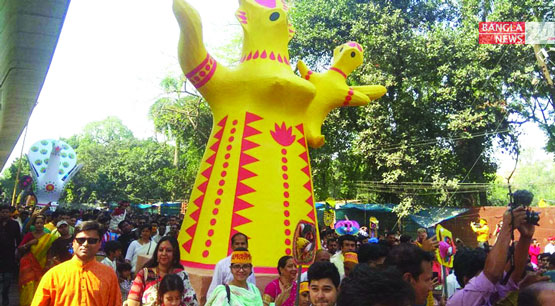Simple Pahela Baisakhdue to crisis-hit Ramadan
Mahfuz Emran: Due to the corona epidemic and the holy month of Ramadan, the festival of the life of Bengalis, Paola Baisakh was not celebrated in Sambar for the last three years. In continuation of the previous three years, the first Baisakh day is being celebrated simply because it falls in the month of Ramadan. In addition, there is no major preparation for Baisakh due to the increase in inflation due to the economic recession around the world and the war between Ukraine and Russia.
On March 8, 2020, the country-wide lockdown started from March 25 of that year due to the detection of coronavirus in Bangladesh. And due to this lockdown, there was no Pahela Boishakh event.
In 2021, due to the coronavirus and Pahela Baisakh on the first day of Ramadan, it was not possible to hold any event that year. Also, in 2022 the day is celebrated in a very simple way as Ramadan falls on the first Baisakh. In the current year 2023, the 22nd day of Ramadan is the first Baisakh, so the Baisakhi festival is being celebrated in a simple manner in the continuation of the previous year.
However, to maintain the tradition of this festival of life, Bangladesh Small and Cottage Industries Corporation (BCIC) and Bangla Academy have jointly organized various programs including Boishakhi Mela.
In this regard, BSCIC Director (Marketing, Design and Crafts) Md. Abdul Matin told, “Pahela Baishakh is being celebrated in the holy month of Ramadan for the past few years. Also, due to the Corona epidemic, there were some restrictions on the celebration of this festival in 2020 and 2021.
He said that on the occasion of the first Baisakh, BSCIC and Bangla Academy have organized a 10-day Baisakhi Mela-1430 in the academy premises. Industries Minister Nurul Majid Humayun Mahmud officially inaugurated the fair on April 14. There are 88 stalls registered by BCIC in the fair. In these stalls, various types of handicrafts, cottage industry and Bengali rural heritage products can be seen.
On the other hand, the Secretary (Joint Secretary) of Bangla Academy. H. M. Lokman told, “In addition to organizing a 10-day fair at Bangla Academy on the occasion of the first Boishakh, several programs have been undertaken around Boishakh. These programs include poetry reading sessions and discussion meetings.
It is known that Eid-ul-Fitr and Paila Baisakh coincide with each other, adding a new dimension to the festival. Apart from Eid shopping, Pahela Boishakh is a platform for large-scale shopping of various types of native clothes, food, handicraft jewelry, flowers, etc. But before 2020, a large number of people were employed around this festival every year. A few years ago, thousands of crores of taka were purchased. But now that situation is no more.
On the first day of Baisakh, Bengaliana gets a new life, is energized. Once upon a time there was a big market for indigenous cottage industry during Pahela Baishak. Also, various kinds of native clothes, native food, handicraft jewelry, flowers, etc. were bought and sold on a large scale during the Boishakhi festival.
The image of a market-centered festival around Bengali New Year or Pahela Boishakh is old for Bengalis. Around the New Year, everything from clay pots to clothes, murimurki, nadu, sweets, hilsa market is decorated everywhere. The rural economy became stronger around these events. This is the familiar form of Bengal. But due to corona epidemic and holy Ramadan, the last three years were very light.
It is known that every year around Baisakh, about Tk 10/12 thousand crores worth of native bamboo, cane, wooden products, clay toys, clay and plastic toys, various types of mururimurki, nadu were sold. The sale of hilsa around the Bengali New Year is several thousand crores of taka. Also, on New Year’s Day, the sales amount in sweet shops is around Tk 3 to 4 thousand crore. During the Bengali New Year, only clothes are sold worth about Tk 25 thousand crore.
All in all, the economy around Bengali New Year is more than Tk 30 to 35 thousand crore. But in the last three years, the economic activities surrounding the Bengali New Year have declined a lot.
In this regard, the president of Bangladesh Shop Owners Association and former vice president of FBCCI Helal Uddin told, “There was no New Year festival for the last three years due to the corona virus. Also last year, even though there was no corona, it was not possible to do any significant event on Pahela Boishakh due to fasting. This year is no exception.
He said, ‘this Pahela Boishakh, the situation is worse than the previous three years. The first reason is the first Baisakh in the holy month of Ramadan. Secondly, the economic condition of people is very bad this year. As a result, there is no opportunity for additional sales. As a result, I do not see any possibility of economic recovery around Baisakh. Due to the recession, many small businessmen have lost capital and become destitute. They are trying to cope with the loss. They are now trying to save lives as well as business.
Rare Israeli airstrike in Beirut kills Hezbollah commander and more than a dozen others
International Desk: Israel launched a rare airstrike that killed a senior Hezbollah milita…








